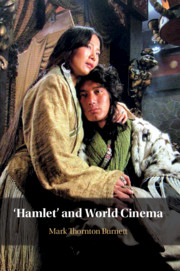Book contents
- ‘Hamlet’ and World Cinema
- ‘Hamlet’ and World Cinema
- Copyright page
- Dedication
- Contents
- Figures
- Acknowledgements
- A note on texts and titles
- Introduction
- Chapter One Hamlet, Cinema and the Histories of Western Europe
- Chapter Two Thematizing Place: Hamlet, Cinema and Africa
- Chapter Three Hamlet and the Moment of Brazilian Cinema
- Chapter Four Pairing the Cinematic Prince: Hamlet, China and Japan
- Chapter Five Hamlet and Indian Cinemas: Regional Paradigms
- Chapter Six Gendering Borders: Hamlet and the Cinemas of Turkey and Iran
- Chapter Seven Materializing Hamlet in the Cinemas of Russia, Central and Eastern Europe
- Filmography
- Bibliography
- Index
Chapter Three - Hamlet and the Moment of Brazilian Cinema
Published online by Cambridge University Press: 21 June 2019
- ‘Hamlet’ and World Cinema
- ‘Hamlet’ and World Cinema
- Copyright page
- Dedication
- Contents
- Figures
- Acknowledgements
- A note on texts and titles
- Introduction
- Chapter One Hamlet, Cinema and the Histories of Western Europe
- Chapter Two Thematizing Place: Hamlet, Cinema and Africa
- Chapter Three Hamlet and the Moment of Brazilian Cinema
- Chapter Four Pairing the Cinematic Prince: Hamlet, China and Japan
- Chapter Five Hamlet and Indian Cinemas: Regional Paradigms
- Chapter Six Gendering Borders: Hamlet and the Cinemas of Turkey and Iran
- Chapter Seven Materializing Hamlet in the Cinemas of Russia, Central and Eastern Europe
- Filmography
- Bibliography
- Index
Summary
I explore the ways in which O Jogo da Vida e da Morte and A Herança deploy locale – the favela and the sertão. I stress the extent to which the films find comparable metaphorical resonances in their respective habitats, highlighting, in so doing, a series of intricate relationships between land, property and poverty. I go on to suggest, in the second section of the chapter, that the films’ intersecting treatment of the communal, the spiritual and the racial is evidenced in their privileging of rituals and celebrations, such as the Claudius/Gertrude wedding or the Old Hamlet/Ophelia funerals. O Jogo da Vida e da Morte and A Herança, I argue, are preoccupied with communities that fail or are unable to provide for their own, thereby introducing images of Brazil that run counter to populist conceptions. As I maintain in the chapter’s final section, A Herança discovers Omeleto/Hamlet at his death as distributing the estate to the peasantry, thus marking a radical break with traditions of land ownership in the north-eastern regions. O Jogo da Vida e da Morte, in contrast, visits little capacity for change on João/Hamlet, stressing his distinctive powerlessness and inertia. While A Herança endorses the ideal of a socialist utopia, then, O Jogo da Vida e da Morte assumes a more nihilistic attitude. Responsive to the straitened political conditions of Brazil in the early 1970s, O Jogo da Vida e da Morte and A Herança reveal the capacity of Hamlet to be pulled in two directions at the same time, occupying recuperative and defeatist positions, to address similar sets of difficulties.
- Type
- Chapter
- Information
- 'Hamlet' and World Cinema , pp. 92 - 120Publisher: Cambridge University PressPrint publication year: 2019
- 1
- Cited by

